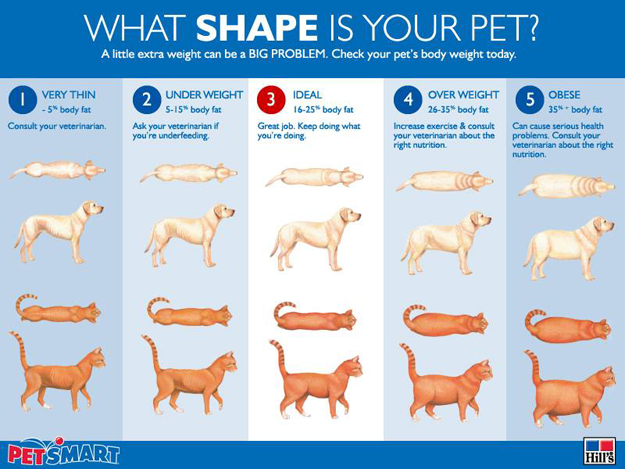A Weighted Question
Nothing is more depressing than stepping on the scale in the
doctor’s office, and seeing that your weight is not where you wish it to be;
and in the veterinary community, we find owners have the same feelings about
their pet’s scale numbers. It is so hard
for veterinarians to even approach the subject of your pet’s overweight or
obese status, without worrying about seriously offending a valued client.
I never want to tell an owner that their pet is overweight,
I don’t even like to use the word overweight, and I never use the word obese,
unless I am so concerned about the pet’s health, that I know using that scary
word is the only way to get a response, and plan, in place.
Why do we care if your pet is heavier than he should be?

Veterinarians are not
worried about your pet’s body image to fulfill some societal norm. Veterinarians feel obligated to point out
your pet’s weight concerns because of all the health risks associated with
being overweight. Your pet won’t wake up
one Monday and decide today is the day he’ll go to the gym, or stop ordering
pizza on Friday nights. You are
ultimately responsible for what goes into your pet, and how much exercise and
activity he gets.
If your pet is overweight when he is young, he is that much
more prone to early joint disease, because that is a greater load on his joints
than ideal. That is many more years of
purchasing pain medication; pain medication that can ultimately have long term
effects on his organs, and also long term costs involved with medicating so
long. He is more prone to diseases like
diabetes, which is a time consuming, and sometimes costly manageable
disease. He is more prone to
inflammation and infection throughout his body, as the medical community has
learned recently that fat cells create inflammatory factors that can wreak
havoc throughout our bodies.
 Young pets can lose weight much more easily than older
pets. We do not want your 10 year old
Fluffy to have to lose 40 lbs when his knees start giving out, or he has frequent
back pain episodes. We want Fluffy to
have had a healthy, active adult life, and start his senior years fit, lean,
and ready to take on the world of doggy retirement. We do not want Mr. Kitty to be diagnosed with
diabetes at 6 years old, only for you to find out that the current high cost of
insulin is not something you can afford.
Young pets can lose weight much more easily than older
pets. We do not want your 10 year old
Fluffy to have to lose 40 lbs when his knees start giving out, or he has frequent
back pain episodes. We want Fluffy to
have had a healthy, active adult life, and start his senior years fit, lean,
and ready to take on the world of doggy retirement. We do not want Mr. Kitty to be diagnosed with
diabetes at 6 years old, only for you to find out that the current high cost of
insulin is not something you can afford.
It is for these reasons that we inwardly cringe, mentally prepare, and then finally broach the subject of your pet’s weight at your wellness visit, or even sometimes on a sick visit, even though none of us want to talk about it at all. Ultimately, Fluffy and Mr. Kitty deserve for us to talk about their weight, and come up with a diet and weight loss plan that is right for them, for their health and well-bring. They may miss that treat they no longer get each night, like I miss my nightly cookies and milk; but I know that in the long run, you will look back and be proud, and empowered, by the choices you made to have a fit and healthy pet.



No comments:
Post a Comment